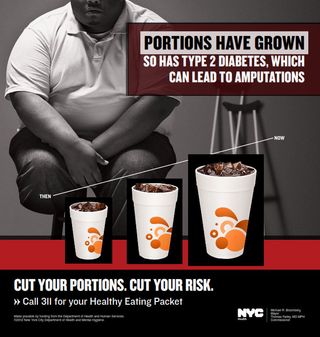Use of Actors, Photoshop Not OK in Health Ads, Experts Say

Whether shocking or saddening, pictures of people who are suffering the consequences of smoking or obesity can be powerful in public health messages. But in some cases, the moving stories are not entirely authentic.
Take the Strong4Life initiative, a campaign run by Children's Healthcare of Atlanta that aims to curb childhood obesity. A girl featured in one of the ads is portrayed as having diabetes, but she does not, according to ABC news. And recently, a New York Times investigation revealed that picture of a man in a diabetes awareness poster was photoshopped to show him without a leg.
You don't expect Red Bull to really give you wings, nor for Snapple to actually be made from the "best stuff on Earth." But how truthful do public health campaign ads need to be? Is it wrong to misrepresent an individual's story to get a do-good message across?
Bioethicists and health communicators say untruthful testimonials in public health campaigns are wrong, even if their messages are, in a broad sense, advertisements. Falseness in these ads loses the public's trust, which is critical in public health initiatives, experts say.
"I think it really hurts the credibility of a campaign when they're using actors," said Timothy Edgar, director of the graduate health communication program at Emerson College in Boston. "If it's not unethical, it's certainly on thin ice, and the ice has a crack in it," Edgar said.
And if the truth comes out — that the actors don't actually have the condition they're portrayed as having — the public's focus shifts to talking about the slipup, rather than the public health advice relayed by the campaign.
"The people who have done this campaign have done themselves a great disservice," Edgar said of the diabetes ads, which ran in New York City.
Sign up for the Live Science daily newsletter now
Get the world’s most fascinating discoveries delivered straight to your inbox.
Personal connection
When Eric Asche, chief marketing officer at Legacy, an organization that advocates prevention of youth smoking, and his colleagues went about creating anti-smoking ads featuring the health effects of tobacco use, it was very important to use real people, Asche said. The goal of Legacy's ads is to present consumers with honest information about tobacco addiction and its consequences. Using real people in the ads is part of that honesty.
"We want to tell the truth," Asche said. "We want to tell the real story, and to tell the real story, we use real people."
To not use a real person would feed many people's perception that smoking's health effects "won't happen to me," which is a view many young people have, Asche said. "It's so easy to dismiss the consequences," he said.
Using real people in ads can also put a face on the struggle, and give the ads a sympathetic tone, Asche said.
Indeed, Edgar said, when he watched a Strong4Life's anti-obesity video ad featuring a girl with diabetes, he felt particularly moved by the girl's story. When he later learned the girl did not have diabetes, "I felt angry. I felt like I had been tricked," Edgar said. "And all of a sudden their whole campaign…went down in my eyes."
Pretending to have a condition when you do not is bad because "you are claiming personal knowledge that you do not have, and a link to others that does not exist," said Arthur Caplan, a bioethicist at the University of Pennsylvania.
Even promoting a behavior such as healthy eating can get you into an ethical mess if you don’t eat healthfully.
"You should not urge people to do things that you yourself do not do, or do not believe in— that harms public trust, which is a key component of public health initiatives," Caplansaid.
Higher standard
City officials in New York said putting real people in their ads was not always feasible, according to the New York Times. "We might stop using actors in our ads if the food industry stops using actors in theirs," John Kelly, a New York health department spokesman, told the Times.
Edgar said he found this comment offensive. If public health campaigns are to be successful, "We have to be better than the food industry. We have to be better strategically, and better ethically."
"We're spending the public's money, that’s why we have such an ethical obligation," Edgar said.
Edgar said it was lazy not to use real individuals in these campaigns, especially when conditions such as diabetes affect so many people.
"I'm sure it wouldn’t be that difficult to find someone who would be willing to devote his or her time," to the initiative, he said.
Pass it on: A public health campaign that features a testimonial from someone who doesn't actually have the disease they're portrayed as having is ethically wrong, experts say.
Follow MyHealthNewsDaily staff writer Rachael Rettner on Twitter @RachaelRettner. Find us on Facebook.

Rachael is a Live Science contributor, and was a former channel editor and senior writer for Live Science between 2010 and 2022. She has a master's degree in journalism from New York University's Science, Health and Environmental Reporting Program. She also holds a B.S. in molecular biology and an M.S. in biology from the University of California, San Diego. Her work has appeared in Scienceline, The Washington Post and Scientific American.
